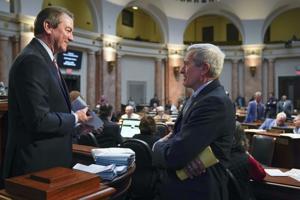Kentucky legislature begins action to legalize historical horse racing machines

(The Center Square) – A bill that seeks to protect historical horse racing in Kentucky took its first step in Frankfort on Thursday when it was passed by a state Senate committee.
The Senate Licensing and Occupations Committee heard testimony on Senate Bill 120. Committee chairman State Sen. John Schickel, R-Union, is the bill’s primary sponsor, and other sponsors include both Republican and Democratic leaders in the chamber.
Historical horse racing, or HHR, is a form of gaming that looks like a slot machine. However, the device uses bets on previously run horse races to determine if the player wins.
The machines have been in play at Kentucky tracks for nearly a decade. However, last fall, the state Supreme Court ruled unanimously the machines do not meet the definition of pari-mutuel wagering and that the Kentucky Horse Racing Commission did not have the power to approve a new form of gaming.
Last month, after the Supreme Court chose not to reconsider its decision, Keeneland and Red Mile, two Lexington tracks, announced they would close their joint facility for the time being. Its closing and the potential job loss mean it’s an issue that “needs to be addressed quickly,” House Speaker David Osborne, R-Prospect, said Wednesday.
Five other HHR parlors remain open, though, despite calls by the Family Foundation of Kentucky to shut down in wake of the court’s ruling. Technically, the Supreme Court ordered a Franklin County court to issue an order based on its ruling. That has yet to take place.
The foundation has been challenging the legality of the machines since they were unveiled. It’s fairly certain the group will challenge any legislation lawmakers pass in this session.
Since the court’s ruling last fall, the state’s racetracks and other stakeholders have called on the General Assembly to pass legislation to allow the machines, which they say are critical to funding purses for live racing and attracting top-level talent in the game.
Trainer Tom Drury told the committee Thursday it was a relief to horsemen when Louisville-based Churchill Downs purchased Turfway and announced it planned to place HHR machines at the northern Kentucky track.
“We felt like we were finally going to get the purses that we needed to be competitive and to keep our horses in Kentucky,” he said.
In fiscal year 2020, nearly $2.3 billion was wagered at the parlors. That led to the tracks receiving nearly $189 million in revenue. Since then, two new facilities have opened.
While the bill enjoys bipartisan support, there is significant opposition to the legislation. In some cases, that exists where the machines are available.
Last fall, Churchill Downs opened Oak Grove Racing and Gaming, a $150 million harness track in southwest Kentucky near the Tennessee state line that can hold up to 1,500 machines. Despite the investment and jobs created the state senator in that district has been a vocal opponent of HHR.
“’Historical Horse Racing’ is a clever marketing term for slot machines,” state Sen. Whitney Westerfield, R-Crofton, tweeted Monday. “The installation of these machines is nothing more than an unconstitutional attempt to build casinos without first asking the voters for approval.”
Legislation to allow the machines isn’t the only issue pertaining to HHR that some want lawmakers to consider.
On Monday, a consortium of 17 organizations called on the legislature to increase taxes on revenues generated from the machines.
Since 2011, more than $9.8 billion has been wagered across the state. Yet, the state has collected less than $207 million in taxes. Of that, only $59.3 million has gone to the state’s general fund.
The letter, signed by such groups as the Kentucky Center for Economic Policy and the Jefferson County Teachers Association, states that the machines are taxed at about 18% of revenue, a rate significantly lower than what neighboring states tax slot machine and video gaming terminal revenue.
“Legalizing this activity but failing to adequately tax it will continue to shortchange schools, health care, infrastructure and other vital services while giving the green light to further expand this rapidly growing form of gambling across the commonwealth,” the letter stated.
Osborne said Wednesday that topic needs to be addressed in budget talks.
“I believe there’s some openness to having those conversations,” he said.
Disclaimer: This content is distributed by The Center Square
